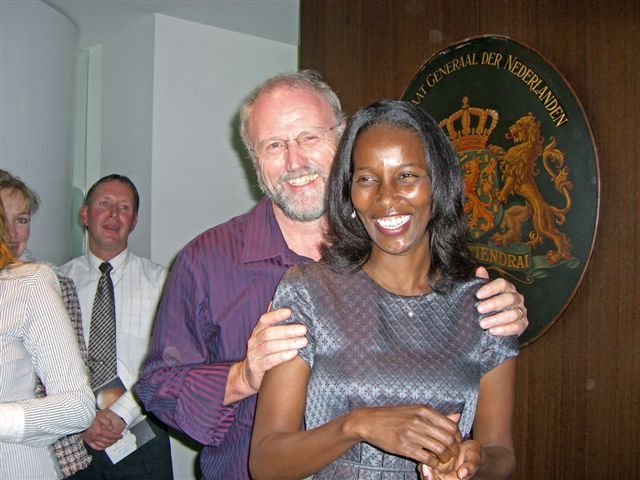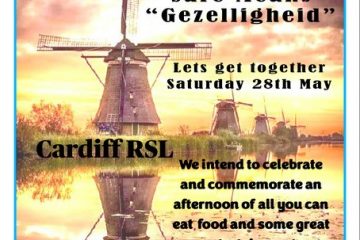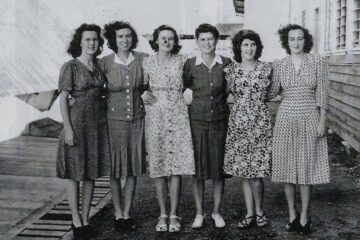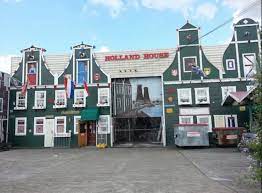Personal report from Paul Budde about his meeting with Ayaan Hirsi. Written in 2007
Her full name is Ayaan Hirsi Ali. She was born in Somalia, in Africa. This is a worn-torn country, which already for many decades doesn’t have a proper government, it doesn’t have a banking system nor government run schools and hospitals in short it misses most basic functions that a society requires.
However, I also know from our own telecommunications reports (BuddeComm) which we write on this country that these are very proud people and that they in one way or another are able to function on systems that are homemade (people power), they even have functional mobile telecoms systems and friends and family who live overseas pay via an ingenious Arabic payment system, of which most money ends up in a central account in Dubai, from where payments are made to the vendors of the technology and they then ship the infrastructure and handsets to the business people in Somalia who run the system and I am sure many other economic and social functions are also in one way or another organised by the people of Somalia.
I had to think of this when I met this proud Somali, she is also very beautiful; long legs and I was also amazed by her long fingers. During dinner I was sitting next to her and I could feel the warm radiation coming from her. She has the most beautiful smile and a certain shyness and innocence that I hadn’t expect from this true hero, who dares to take on some of the most dangerous people on earth, a truly brave person.
Ayaan fled Somalia as a young girl, but not after her mother and grandmother had mutilated her genitals, this is in 2007 still allowed under a millennia old custom that still flourishes under the Islam religion in this region. Looking at this beautiful lady and thinking of this caused shivers over my spine, too horrible to think about.
She fled to Kenya and then in 1992 she fled to the Netherlands. She was welcomed in this country, received a university education at the prestigious university of Leiden and made there many friends. She became an advocate of human rights for suppressed women; in particular those who like herself were brought up under Islamic law. This resulted in the Dutch political system becoming interested in here. There are many problems with emigrants from Morocco and Turkey in the Netherlands and in recent years there has been an increase in Islamic fundamentalism especially under 2nd and 3rd generation emigrants. She joined the Labor Party in order to get more attention for her cause, however, her cause is a-political and when the Liberal Party offered her the position as a MP, she grabbed that opportunity and thus became the famous person she now is.
She made a documentary over the mistreatment of Islamic women and consequently the film maker of this movie, the outspoken Theo van Gogh, was killed by one of those fundamentalist, this shocked Ayaan, this shocked the Netherlands and this indeed shocked the world; especially because the Netherlands – for centuries – had been known as one of the most tolerant societies in the world.
Ayaan also received several death threats and when I met her in Sydney she had two body guards, two in the car in which she travelled and two in a following car, she was quite cool about it, but I am sure that this is an enormous encroachment on her private life, she joking me told me she can’t fall in love without getting the man first checked out by security. She loved Sydney as she was anonymous.
Anonymous?? In the preceding days there were full page articles in the newspapers here and I told here that, in one week, she got 1000% more press coverage than the combined visits of all Dutch Royals, Dutch Ministers and Prime Ministers to Australia over the last two decades.
Australia was fascinated by her and every Australian I spoke to had heard of her, red about her, heard on radio or had seen her on the TV, absolutely amazing.
Last week (June 2007) I got an email from Margriet Bot the Consul General of the Netherlands inviting me to a function at the consulate for a meeting between Ayaan and the Dutch community and I grabbed the opportunity with both hands, I was even more delighted to get a follow up email from her with an invitation to afterwards have dinner with Ayaan at Margriet and her partner Edmond’s place, we were with only 8 people so what an opportunity to get to know her a bite better. As Louise was in Florence I was on my own and Ayaan was on her own; so we sat together .
The reason for her visit was the promotion of her book ‘The Infidel’, the title says it all and it is an absolute bestseller around the world. In this book she tells the shocking story of her life.
Her presentation at the Consulate rapidly turned in a lively discussion with the0 or so Dutchies. Margriet had a lovely, very personal introduction, she is very good at that. After a brief story of her life Ayaan opened the discussion, she was bombarded with questions, some very personal, when Margriet wanted to ‘protect’ her she waved that away, she wanted to be engaged and she wanted to engage us, the atmosphere was electric in a very positive way. In the end Margriet indeed had to intervene as Ayaan would have gone on for a long time, she loved it to be with us Dutchies; the whole conversation was in flawless Dutch.
To the surprise of most of us, one of the first things she mentioned was that she loves the Netherlands and that all of her friends do live there, she comes there regularly and intends to go back. This was quite amazing because in 2005, thanks to a ‘politically correct’ action from the than Dutch Minister for immigration questions were asked about the legality of her Dutch citizenship. In order to get into the Netherlands, she had lied about her real name and hadn’t mentioned that she had lived in Kenya before fleeing to the Netherlands. While this was known by the government it was rekindled by the minister and this caused a furore in the country, which led to the fall of the government.
However, I believe that most Dutch people remain very sympathetic of her which is also reflected in the fact that she was allowed to keep her Dutch passport. Before the affaire she had already decided that she had politically fulfilled what she had set out for herself she wanted to do, she had very clearly raised the issue and had put her stamp on an European wide discussion on the issues of women under Islamic law and the suppression of the free will especially under theocratic Islamic regimes. She also needed some personal space and had accepted a research position in Washington DC, where she is currently living.
I am not going to detail her cause as the book describes this much better than I will ever be able to do. But what did I pick up from the discussions with here were the following points.
Be aware that our western, democratic and in general tolerant western values are not compatible with the values of the fundamentalists. While we are in general used to negotiate with each other in order to get more or less acceptable social or political outcomes; fundamentalist don’t think that way. Ayaan mentioned that – especially the Netherlands- this had created an overly tolerant society that didn’t take that level of fundamentalism into serious enough account. The ugly side of this was not openly discussed outside the living room of the Dutch people. The Netherlands according to Ayaan has signed all the human rights treaties that exist and have created a position for itself that makes it very difficult to challenge fundamentalism, this was hushed away by the politicians as untouchable ‘cultural’ issues, and people were allowed to have their own believes, etc.
The Dutch are/were still trying to negotiate with these fanatic people in the hope to change the positions of these fanatics. However, as we know from TV reports even when these people are trailed they keep defiant; they keep smiling when horrific equations are made against for the murder of innocent people, their life is based on the afterlife they are not accountable to ‘life on earth’ and are above secular laws and regulations. For them the only law that exist is their religious law.
Ayaan argued that we should be far more adamant in ensuring that our values are ‘enforced’ throughout our society. Segregating as is taking place in the Netherlands (and elsewhere – including Australia), together with the typical Dutch tolerance (especially at a political level) towards other peoples and cultures allow these fanatics to run their own shows in schools, community centres and in their own families, thus breeding more and more fundamentalists. She argued that we should ensure that our values should be included also in the social and cultural activities of those who emigrate – of their own free will – to societies that adhere to western values; most critical of them being the separation of state and religion.
She also discussed that Australia could learn from the mistakes made in Europe and she had earlier that day also met with various politicians in Canberra, who were so impressed with her that she was invited back for follow up meetings with more and other Australian officials.
She was looking forward to that and at the end of the evening we made a pact to have a reunion dinner on her return to Sydney. Her mobile phone went off a couple of times during the dinner, she didn’t answer, she knew it were here bodyguards but she didn’t want to go to her hotel, she loved the ‘gezelligheid’ you could see this was her genuine feeling about the evening, our dinner discussions were typical Dutch very animated, very involved and sometimes heated, Edmond had opened up his best wines and the whole night was just one of those absolute treasures of life. It was not until after midnight that we reluctantly broke up, we all got a big hug from her, with the typical three Dutch kisses. She left in her security car, which speeded away, followed by the other bodyguards; that scene brought us all back down to earth, that was her reality, while we all leisurely and casually went our own ways in total freedom. She left the 7 of us richer, warmer and more adamant to do our bit to make this world a better place for all of us.
Paul Budde
Bucketty 5th June 2007



